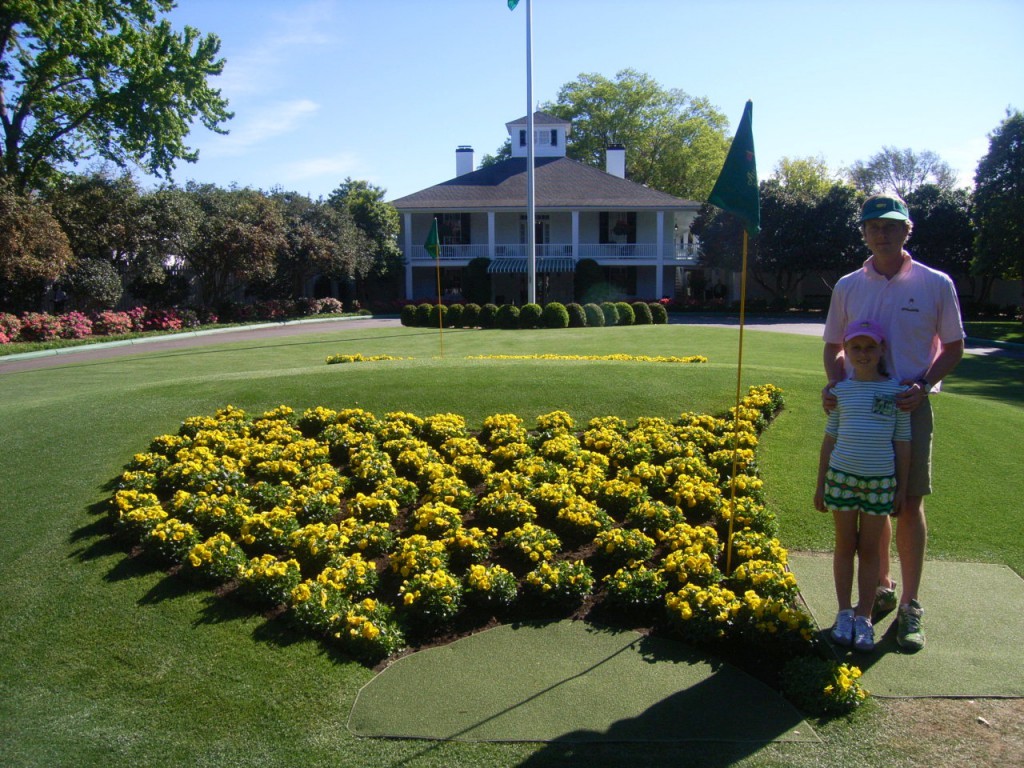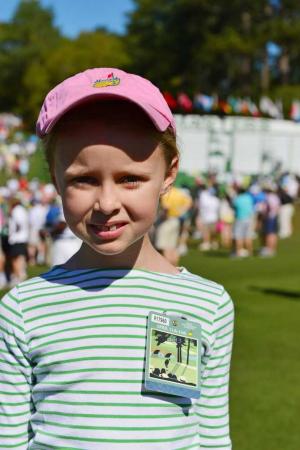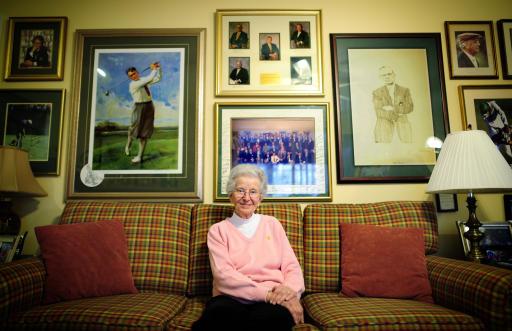Will Stegall attended the Masters for the first time in 1993, when he was a teenager. “My grandfather would always give me a crumpled old copy of a Herbert Warren Wind article from The New Yorker to read as we drove from Birmingham to Augusta,” he told me in an email back in March. “I remember sitting on No. 16, about hole-high, on Sunday in 1996. Raymond Floyd’s ball landed on the front of the green, rolled up the ridge to the right, back down, and into the cup. The ball must have rolled for forty-plus feet and the whole crowd knew what was coming from the time it landed. It was the first time I had ever witnessed a hole-in-one and it almost inspired me to start wearing pants with just one back pocket.”
This year, Stegall, who now lives in San Francisco, took his daughter, Annie, who turned nine on practice-round Monday. At my request, Annie took notes during the tournament. She had a highly favorable impression of the Georgia Peach Ice Cream Sandwiches, which are new, and which she managed to try before the sportswriters in the Press Building had eaten all of them. More from her report:
This year was the seventy-seventh Masters. My great-grandfather got tickets a long time ago and always loved it. Once my grandfather was old enough, he started going and has now gone to fifty of them, my dad has gone to twenty, and this year was my first.
My dad and I flew from San Francisco to Atlanta on Friday, April 12, and drove to my aunt’s house in Augusta. I didn’t sleep very well because of the time change, but when it was finally morning we were so excited that we got up early. We had to get to the course to put our chairs on the left side of the eighteenth green. When I got out of the car in the parking lot, the first thing I said was, “It smells really good.”
Before I tell you about golf, I am going to tell you about the Augusta National golf course. First of all, let me tell you how green it was! It was so perfect that at first I thought the grass was fake. The grandstands were green, the concessions stands were green, the trash picker-uppers’ uniforms and their pokey things were green, along with the sandwich wrappers and even the beer cups.
And now to the main thing: the golfers. They could hit the ball so high and so long I couldn’t believe my eyes. I loved that you could be so close and nobody would tell you to step back. It was awesome watching an eighth grader beat Bubba Watson and other Masters winners. Angel Cabrera rolled me one of his balls and the forecaddie of the 16th hole gave me Tiger Woods’s tee. I also got an autograph from Brandt Snedeker.
My dad and I kept a notebook of bets on who would win, who would have the lowest round each day, and who would hit the closest on each hole. I crushed my dad. He predicted Brandt Snedeker would win but I said Snedeker would have a bad round at the end and Adam Scott would win. I was right!
Among Annie Stegall’s favorite Masters features was the absolute ban on cell phones, because it kept her father focused on the tournament and on her, rather than on his work. And her father didn’t feel deprived. “The Masters is a far more social event than some folks might expect,” he told me afterward. “And coordinating to meet up with buddies without the aid of cell phones is as much a throwback as the hand-operated leader boards. Pick a spot like the sixteenth tee, as Annie and I did on Sunday, and you end up chatting with strangers. Many of them have been sitting in that spot for decades and have great stories about miraculous or horrible shots through the years. I have some favorite Masters (several from the nineties, 2007, 2010) but they always have more to do with the people I’m with and less to do with the outcome of the tournament. It’s probably my favorite week of the year.”
On Saturday, Annie was picked by the Augusta Chronicle as the Junior Patron of the Day, so she got her picture in the newspaper, too (see below). Next year, I’m going get her press credentials, then turn everything over to her.




